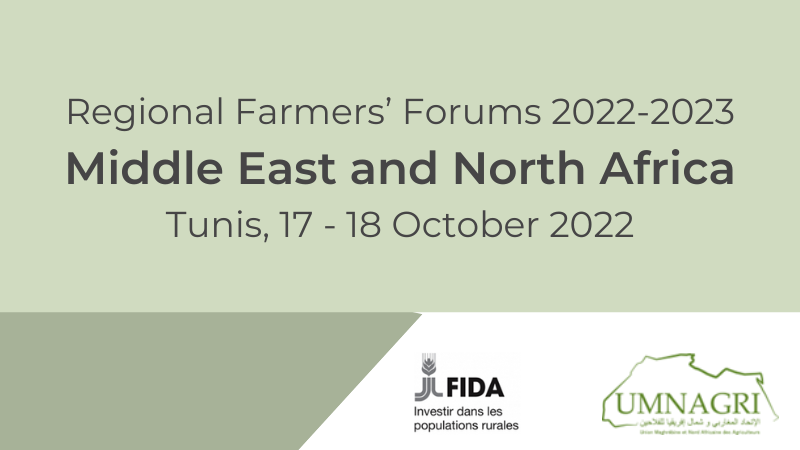On Monday, 17 October 2022, the Head of Advocacy, Policy and Partnerships of the World Farmers’ Organisation (WFO), Luisa Volpe, joined virtually the Regional Farmers’ Forum Middle East and North Africa (Tunis, 17-18 October 2022), organised by the Union Maghrébine et Nord Africaine des Agriculteurs (UMNAGRI) and the International Fund for Agricultural Development (IFAD).
Established in 2005, the Farmers’ Forum (FAFO) is an ongoing, bottom-up process of consultation and dialogue between organisations of small-scale farmers and rural producers from all over the world, IFAD and governments, focused on agricultural and rural development and poverty reduction.
The FAFO regional meetings take place in different regions around the world with the aim of strengthening impact at the country level.
The Regional Farmers’ Forum Middle East and North Africa was the occasion for an assessment of the current partnerships between IFAD and Farmers’ Organisations in the region, but also the occasion to share the best results from these experiences of collaboration in terms of tools and approaches implemented, governance, etc.
WFO has been a Member of the FAFO Steering Committee since 2016. Ms Luisa Volpe joined the conversation to represent WFO in the meeting and reiterate WFO’s commitment to supporting FAFO in its efforts to build farmers’ organisations’ capacity to engage in policy dialogue.
“Global advocacy should be fed with local solutions that farmers have already found in their farms”- Luisa Volpe, WFO Head of Advocacy, Policy and Partnerships
“We believe that the real strength of farmers relies on their local experiences, and in WFO, we work to reinforce the link between local and global. We think that global advocacy should be fed with local solutions that farmers have already found in their farms” – she stated – “Our aim in the short period is to strengthen farmers’ organisations at the local level, strengthen their capacities”.
The WFO Head of Advocacy, Policy and Partnerships also remarked that today farmers are affected by several challenges (pandemic, climate change, conflicts, access to inputs, price modification, increasing hunger and malnutrition…) but they need to be resilient: “Farmers have to survive every day on their farms. On their farms, farmers always find very precious solutions, which ensure that farmers keep alive their business and that agriculture remains alive as a key sector in all economies. Consultations with the farmers are key. That is why we are putting in place a Farmers’ Consultation Methodology. Our main expectations from FAFO are leveraging farmers’ and farmers’ organisations’ solutions and linking them to global organisations such as FAO and IFAD and joint efforts.”
Leveraging our membership at the national level, we, as WFO, want to propose to make a bet on this new way of working, reversing the process from top-down decision-making over the farmers’ community to a real bottom-up process in which farmers are listened to in what they need, what they do, in what they experience on the farm. Starting from there, we can bring forward sustainable solutions for a promising future for the agricultural sector.
